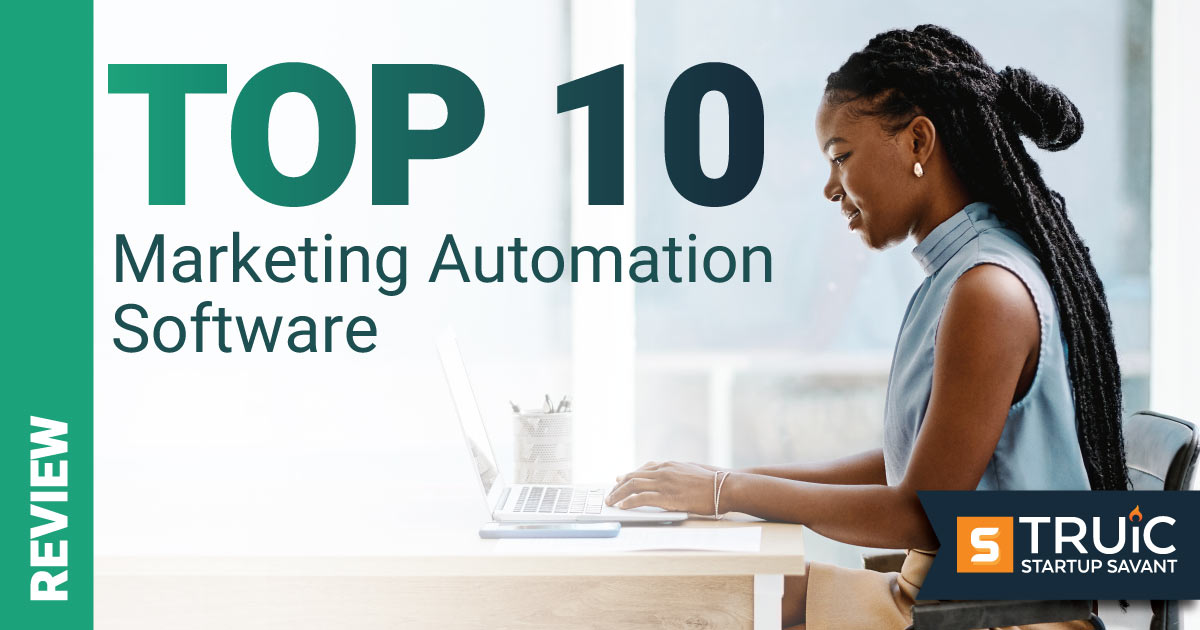Influencer Marketing for Startups: A Comprehensive Guide

Last Updated: By Michaela Dale
Influencer marketing has emerged as a powerful tool for startups looking to build brand awareness, reach target audiences, and drive growth. By partnering with influential social media personalities, startups can tap into engaged communities and leverage the trust and credibility of these influencers. In this article, we'll explore the basics of influencer marketing for startups, including key concepts, strategies, and best practices.
Recommended: Check out our review of the best influencer marketing platforms for startups.
Understanding Influencer Marketing
To effectively leverage influencer marketing strategies, startups must first understand the core concepts and principles behind this marketing strategy. This section will define influencer marketing and explore the different types of influencers with which startups can collaborate.
What Is Influencer Marketing?
Influencer marketing is a strategy where brands partner with influential social media personalities to promote their products or services. These influencers have built trust and credibility with their large, engaged followings in specific niches. By leveraging the reach and trust of influencers, startups can expand brand awareness, reach target audiences, and authentically drive conversions.
Influencer marketing has revolutionized the marketing landscape since its emergence. As social media platforms have grown and evolved, so too have the opportunities for brands to collaborate with influencers. Today, influencer partnerships are a core component of many startups' marketing strategies.
Types of Influencers
Influencers come in various tiers based on their follower counts:
- Mega-influencers: Celebrities with more than 1 million followers
- Macro-influencers: Individuals with 100,000 to 1 million followers
- Micro-influencers: Niche experts with 10,000 to 100,000 followers
- Nano-influencers: Everyday consumers with 1,000 to 10,000 highly engaged followers
Each tier offers distinct advantages. Mega- and macro-influencers provide massive reach while micro- and nano-influencers often have higher engagement rates and more targeted audiences. Startups should consider their goals, budget, and target demographics when selecting the right tier of influencers for their marketing campaigns.
Importance of Influencer Marketing for Startups
Influencer marketing offers numerous benefits for startups looking to establish their brand and drive growth. These are the key advantages of influencer partnerships, including building brand awareness, targeting specific audiences, and achieving cost-effective results.
Building Brand Awareness
In today's social media-driven world, more than 4.59 billion people use social platforms worldwide. Influencer partnerships enable startups to tap into influencers' large audiences and increase the visibility of their brand.
By collaborating with influencers who align with their brand values and aesthetics, startups can gain exposure to new audiences and establish a strong brand identity. Influencer-created content featuring the startup's products or services can quickly expand reach and generate buzz.
Targeting Specific Audiences
Influencers have cultivated followings in specific niches. By collaborating with relevant influencers, startups can precisely target the demographics and interest groups that align with their ideal customer profiles. This leads to higher engagement and conversion rates compared to traditional marketing channels.
For example, a startup selling eco-friendly beauty products could partner with influencers in the sustainable living space to reach environmentally conscious consumers. By tapping into the influencer's niche audience, the startup can connect with potential customers who are more likely to resonate with their brand message and products.
Achieving Cost-Effective Results
Influencer campaigns — especially those with micro- and nano-influencers — are often more cost-effective than other forms of paid advertising. Many influencers are open to partnerships in exchange for free products, commission-based compensation, or smaller upfront fees. This allows startups to execute impactful marketing on limited budgets.
Moreover, influencer-generated content can often be repurposed across the startup's own marketing channels to provide additional value and cost savings. By building long-term relationships with influencers, startups can establish a continuous stream of high-quality, affordable content.
Implementing Influencer Marketing for Startups
To successfully execute an influencer marketing strategy, startups need to follow a series of key steps: identifying the right influencers, setting clear goals and objectives, and establishing authentic partnerships.
Identifying the Right Influencers
Successful campaigns begin by identifying influencers who are a natural fit for the brand. Startups should seek out influencers whose content, values, and audience align with their own. Tools like social media listening, influencer databases, and manual research can aid in this discovery process.
When evaluating potential influencers, startups should consider factors like:
- Relevance to the brand and product
- Quality and style of content
- Engagement rate and audience demographics
- Brand partnerships and sponsorship history
- Alignment with brand values and messaging
By thoroughly vetting influencers, startups can ensure they are partnering with individuals who will be effective brand advocates and resonate with their target audience.
Setting Clear Goals and Objectives
Before engaging influencers, startups must define their campaign goals. Common objectives include increasing brand awareness, driving website traffic, generating leads, or boosting sales. Clear goals guide influencer selection, content direction, and performance measurement.
If a startup’s primary goal is to drive product sales, for instance, it might focus on influencers with high conversion rates and provide them with unique discount codes to share with their followers. If the objective is to increase brand awareness, a startup may prioritize influencers with large followings and encourage content that showcases its brand story and values.
Establishing Authentic Partnerships
Authenticity is crucial in influencer marketing. Startups should give influencers the creative freedom to promote products in their unique voice and style. Forced or overly promotional content can erode audience trust. The most impactful partnerships are built on genuine brand affinity and clear communication of expectations.
To foster authentic partnerships, startups should:
- Provide influencers with comprehensive brand guidelines and key messaging points
- Allow influencers to experience the product or service firsthand
- Encourage influencers to share their honest opinions and experiences
- Maintain open lines of communication throughout the partnership
- Cultivate long-term relationships with top-performing influencers
By prioritizing authenticity, startups can create influencer content that resonates with audiences and drives real results.
Measuring Success in Influencer Marketing Campaigns
To optimize an influencer marketing campaign and demonstrate a return on investment (ROI), startups must track and analyze key performance metrics. This section will explore the essential key performance indicators (KPIs) for influencer campaigns and discuss strategies for tracking ROI and engagement.
Key Performance Indicators
The specific KPIs for an influencer campaign will depend on a startup's goals. Common metrics to track include:
- Reach and impressions
- Engagement rate (e.g., likes, comments, shares)
- Click-through rate
- Conversions and sales
- Earned media value
- Sentiment analysis
By establishing clear KPIs upfront, startups can measure the impact of their influencer partnerships and optimize their strategies over time. Regular reporting and analysis allow startups to identify top-performing influencers, content themes, and platforms.
Tracking ROI and Engagement Metrics
To measure the ROI of influencer campaigns, startups need systems in place to track results. Unique links, promo codes, landing pages, and Urchin Tracking Module (UTM) parameters make it possible to attribute website traffic and sales to individual influencers. Social listening tools and influencer marketing platforms often gauge an audience's response and sentiment toward the promoted content.
Startups also should track engagement metrics, such as likes, comments, shares, and saves to evaluate the resonance of influencer content. High engagement rates signal the content is striking a chord with the target audience and driving meaningful interactions.
By diligently tracking ROI and engagement, startups can continually refine their influencer strategies and allocate resources to the partnerships and tactics that deliver the greatest impact.
Common Mistakes to Avoid in Influencer Marketing
While influencer marketing can be highly effective, startups must be aware of potential pitfalls and mistakes to avoid. These are the common missteps in influencer partnerships a startup should avoid to maintain authenticity, leverage micro-influencers, and ensure proper disclosure.
Lack of Authenticity
Influencer content that comes across as inauthentic or overtly commercial can hurt a startup's reputation. Influencers should have a genuine affinity for the products they promote. Startups also must ensure proper Federal Trade Commission (FTC) disclosure of sponsored relationships to maintain transparency.
To avoid the pitfalls of inauthenticity, startups should:
- Partner with influencers who genuinely align with and believe in the brand
- Encourage influencers to share their honest experiences and opinions
- Provide creative freedom for influencers to promote products in their own style
- Ensure clear and prominent disclosure of sponsored content
By keeping authenticity at the forefront, startups can build trust with audiences and maximize the impact of their influencer partnerships.
Neglecting Micro-Influencers
While mega- and macro-influencers have massive reach, engagement rates often drop as follower counts rise. Micro-influencers with smaller, but dedicated audiences can drive strong results — often at lower costs. Startups shouldn't overlook these niche opinion leaders.
Micro-influencers often have higher engagement rates and more targeted, loyal followers. Their endorsements can carry significant weight because their audiences trust their recommendations. Moreover, micro-influencers are typically more affordable and flexible than their larger counterparts.
Startups can often achieve a higher ROI by collaborating with a diverse mix of micro-influencers across relevant niches. By tapping into multiple engaged communities, startups can amplify their message and drive meaningful results.
Failure to Disclose Partnerships
The FTC requires clear and prominent disclosure when companies compensate influencers for endorsements. Failing to use the “#ad” hashtag or similar indicators can lead to legal repercussions and damage audience trust. Startups must educate influencers on proper disclosure protocol.
To ensure compliance and maintain transparency, startups should:
- Include disclosure requirements in influencer contracts and briefs
- Provide influencers with sample disclosure language
- Monitor influencer content for proper disclosures
- Maintain records of influencer relationships and compensation
By prioritizing transparency and adhering to FTC guidelines, startups can build credibility with audiences and avoid legal pitfalls.
Conclusion
Influencer marketing offers startups an avenue to build brand awareness, connect with target audiences, and drive conversions through trusted voices. When executed strategically, influencer campaigns can yield impressive results with cost efficiency.
By partnering with authentic, relevant influencers and tracking performance metrics, startups can maximize the impact of their influencer initiatives. As the influencer landscape continues to evolve, staying attuned to best practices and emerging trends will be key to success.


